On 1 October 2019, Schlager singer and actor Karel Gott (1939-2019) passed away. He was the most successful male singer in the Czech Republic and also had many successes in German-speaking countries. He released more than 125 albums during his career, selling over 30 million records worldwide. In the annual national poll Český slavík, ‘the Sinatra of the East’ was thirty-eight times elected as the Most Favourite Male Singer.
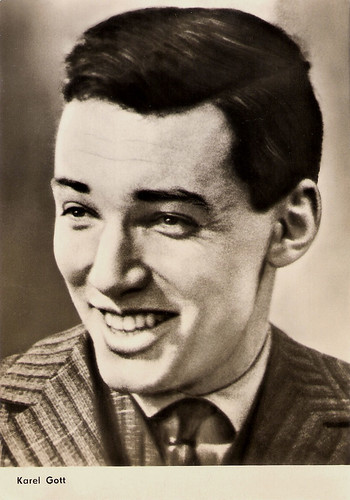
East-German postcard by Progress Starfoto, no. 2376, 1965. Karel Gott in Kdyby tisíc klarinetu/If a Thousand Clarinets (Ján Rohác, Vladimír Svitácek, 1965).
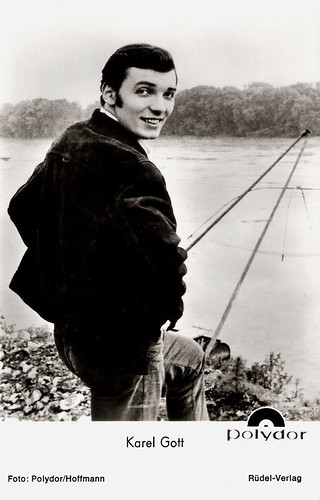
German postcard by Franz Josef Rüdel, Filmpostkartenverlag, Hamburg, no. 4909. Photo: Polydor / Hoffmann.

East-German postcard by VEB Progress Film-Vertrieb, Berlin, no. 3094, 1968. Karel Gott in Ta nase písnicka ceská/The Czech song (Zdenek Podskalský, 1967).
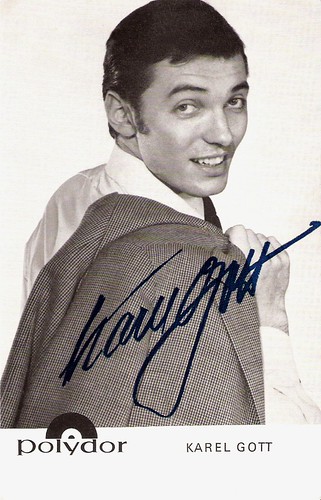
German promotion card by Polydor.

East-German postcard by Progress Film-Verleih, Berlin, no. 113/77, 1977. Photo: Mirvald.
Karel Gott was born in 1939 in Pilsen, at that time Protectorate of Bohemia and Moravia, now Plzeň, Czech Republic, and has lived in Prague since age 6. He initially wanted to study art but failed the exams at the School of Industrial Art, upon which he began training as an electrician.
On completing his studies, he began working as an electrician but was soon fascinated by the new types of music flooding the city, and became interested in jazz. He experimented with playing the bass and the guitar but eventually decided to focus on singing, studying it privately. In 1958, he participated in the amateur singing contest Looking for New Talent in the Prague Slavonic House. He utterly failed to impress the judges, but soon made a name for himself in Prague jazz circles, finally getting his first engagement at the Vltava Prague Cafe that same year.
In 1960, he decided to undertake singing professionally. He studied opera at the Prague Conservatory under Konstantin Karenin, a student of the brilliant Russian bass Feodor Chaliapin. Knowing of Gott's interest in current musical trends, Karenin instructed him not only in classical Italian pieces but also in the hits of the day. It was at this time that Gott travelled abroad (to Poland) for the first time with the Jazz Orchestra of the Czechoslovak Broadcast, conducted by Karel Krautgartner.
In 1962 or 1963 (the sources differ), Gott released his first single, Až nám bude dvakrát tolik (When we are twice as old), a duet with jazz singer Vlasta Průchová. Gott was voted into the Zlatý slavík (Golden Nightingale) viewer's survey, placing 49th and receiving a total of three votes.
His first solo single, 'Mesicni reka', the Czech version of 'Moon River' became his breakthrough hit in 1962. In 1963 Gott was offered a place at the recently founded Prague Semafor theatre, which was then at the forefront of the emerging Czechoslovakian pop music scene. He released 'Oči sněhem zaváté' (Eyes Covered by Snow), which became the year's best-selling record. Shortly afterwards, Gott received the first of his Zlatý slavík awards, given to the most popular artist of the year.

Czech postcard by Pressfoto, Praha (Prague). Photo: Karel Gott and Jana Brejchova in Kdyby tisic klarinetu/If a Thousand Clarinets (Ján Rohác, Vladimír Svitácek, 1965). Collection: Carla Bosch.
Carla: I suspect that on these two cards is the film crew making the documentary. With Jana Brejchova, Waldemar Matuska, Hana Hegerova, Eva Pilarova, Karel Gott, Jiri Suchy, and Jiri Slitr. They are all watching television. In the public are soldiers who are holding musical instruments.

Czech postcard by Pressfoto, Praha (Prague). Photo: publicity still for Kdyby tisic klarinetu/If a Thousand Clarinets (Ján Rohác, Vladimír Svitácek, 1965). Collection: Carla Bosch.
Carla: Kdyby tisic klarinetu/If a Thousand Clarinets (Ján Rohác, Vladimír Svitácek, 1965) is a fantasy musical film about a mysterious statue of the composer Johann Sebastian Bach that changes guns into musical instruments. The news spreads and a television station decides to make a documentary film about the subject. My guess is that it must be something like how music can change people. And, more peculiarly, how soldiers change when they are not holding guns, but musical instruments instead... But that is just a wild guess.

Czech postcard by Nakladatelstvi Pressfoto, Praha, no. C 11148. Photo: Vileru Rosegnal.
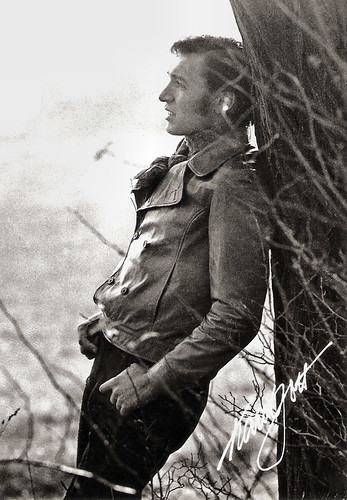
Czech postcard by Nakladatelstvi Pressfoto, Praha, no. C 23365-3. Photo: Jaromir Svoboda.
In 1965, Karel Gott was a major star, appearing in the programmes Pilgrimage for Two and Evening Prayer while building his own repertoire with his own orchestra. That year, he made his first film appearance in the musical Kdyby tisíc klarinetu/If a Thousand Clarinets (Ján Rohác, Vladimír Svitácek, 1965) with Jana Brejchová. He also established the Apollo Theatre, along with two brothers who were with him in Semafor: Jiří and Ladislav Štaidl. He began composing his own songs and toured Czechoslovakia and abroad with the Apollo Theatre.
His first album, 'Karel Gott Sings' got great acclaim. This first album was followed by an English export album titled 'The Golden Voice of Prague'. In 1967, Gott performed at MIDEM, the International Fair of Record Companies and Music Producers in Cannes, France, where the applause was measured during every concert. He surprised everyone by achieving a level of 54 to Tom Jones' 58. Following this event, Gott signed a contract with the Polydor / Deutsche Grammophon Gesellschaft record company, renewing it several times until it became a life contract in 1997. Between 1967 and 2000, Polydor released over 125 albums and 72 singles for Karel Gott in German-speaking countries in Europe.
Films in which he appeared were Mucedníci lásky/Martyrs of Love (Jan Nemec, 1967) with British director Lindsay Anderson, and the German comedy Charley's Onkel/Charley’s Uncle (Werner Jacobs, 1969) featuring Gustav Knuth. Gott represented Austria in the Eurovision Song Contest 1968 with the song 'Tausend Fenster', written by Udo Jürgens. He finished in 13th place. In the same year, Gott spent six months performing daily at the New Frontier Hotel and Casino in Las Vegas.
In the 1970s, domestic success was marked by Gott's presence on television, including the filming of a ten-part serial entitled Karel Gott in Slany. In 1971, after deciding not to return from a concert tour in West Germany to his home country, he was addressed a personal letter from the Czechoslovak party leader Gustav Husak persuading him to change his mind. One of his most best-known pop hits was the title music to the Japanese anime series Maya the Honey Bee (1975). The original theme was composed by Karel Svoboda and sung by Karel Gott in the German, Czech and Slovak versions. In 1975 he also played the lead in the film musical Hvezda pada vzhuru/A Star Is Falling Upwards (Ladislav Rychman, 1975).
Karel Gott recorded a cover version of the song 'All by Myself' called 'Kam tenkrát šel můj bratr Jan' (Where Did My Brother Jan Go This Time). The song was dedicated to Jan Palach who set himself on fire and burned to death as a protest against Soviet occupation of Czechoslovakia in January 1969. According to Wikipedia, the song was recorded in 1977 while Soviet troops were still present in the country. To continue in his career, he had to sign in 1977 the so-called ‘Anti-charter’, a petition organised by the Communist government against Charter 77 signed by Václav Havel and other dissidents, protesting the government's violations of the Helsinki Accords.
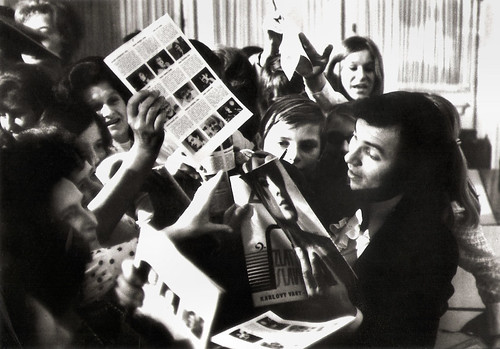
Czech postcard by Nakladatelstvi Pressfoto, Praha, no. 53/3. Photo: Alexandr Janovsky.
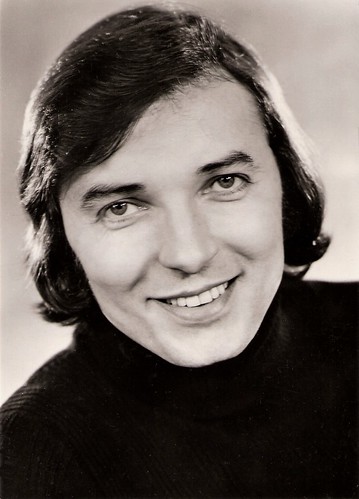
East-German postcard by Bild und Heimat, Reichenbach, no. G 6776, 1976. Photo: Leher, Berlin.
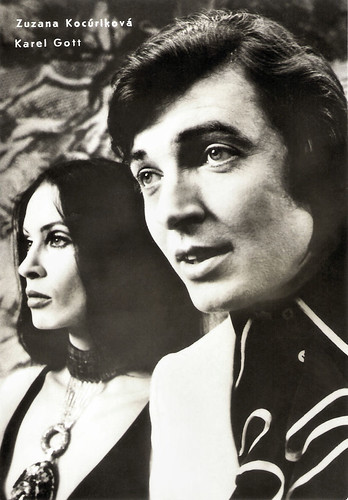
East-German postcard by Progress, Berlin, no. 33/76, 1976. Photo: publicity still for Hvezda pada vzhuru/A Star Is Falling Upwards (Ladislav Rychman, 1975) with Zuzana Kocúrlková.
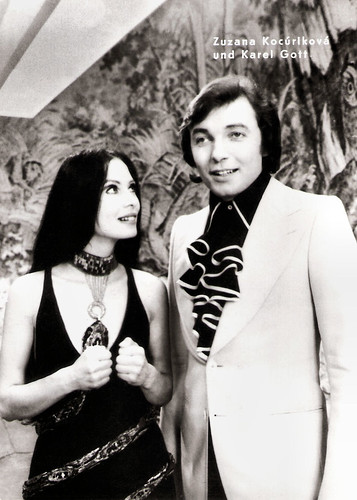
East-German postcard by Progress, Berlin, no. 41/76, 1976. Photo: publicity still for Hvezda pada vzhuru/A Star Is Falling Upwards (Ladislav Rychman, 1975) with Zuzana Kocúrlková.
The 1980s were marked for Karel Gott by international success, including the filming in Italy of the musical In the Track of Bel Canto (1981), with a corresponding German-Italian album and duet performance with Sofia Rotaru in the Soviet Union. In the following years, Gott received many awards, including The Supraphon Diamond Record Award, given him in 1992, for having sold 13 million records.
In 1990, he decided to end his career and arranged a huge farewell tour. However, the tour was so successful that he re-evaluated his decision. The 1990s were influenced by fundamental changes in the political system of the country, which were reflected in popular music, but it did not threaten his permanent position in the limelight of the domestic music scene. In 1991 a new television survey was created called TýTý. Karel Gott gained the first victory and at the same time became the outright winner of the survey.
In 1993, he established his own artistic agency, GOJA, with František Janeček. It is this agency that lately produced Gott's records and organised his artistic activities. In 1996, following renewed public interest in his career, Gott again won 'The Golden Nightingale Award' with a huge lead over his rivals, and retained the accolade many times since. Gott remained popular in several countries, including those of the former Soviet Union, where his first record, produced by Melodiya in 1977, sold a staggering 4.5 million copies. In 2000, he had his first concert at Carnegie Hall, in New York.
During the 1990s, Gott began to focus increasingly on painting, his second great love. The first exhibition of his paintings took place in 1992, at the Prague Christ Child Gallery. He also exhibited his work successfully in Berlin, Moscow, Munich, Cologne, Vienna, and Bratislava. In 2001, he played the double role of Lucifer and God in the family comedy Z pekla stestí 2/Goblins and Good Luck 2 (Zdenek Troska, 2001). He also acted regularly in TV series.
Gott had two adult daughters, Dominika and Lucie, from former relationships (they have different mothers). He was also the father to Charlotte Ella with Ivana Macháčková whom he married in 2008 in Las Vegas, the city where he started his international career. Their second daughter, Nelly Sofie, was born in the summer of 2008. Karel Gott passed away in Prague, Czech Republic, at the age of 80.
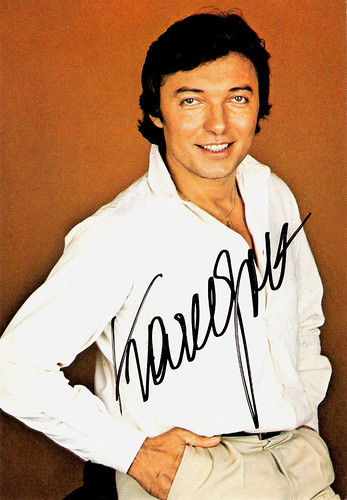
German promotion card by Polydor, no. 49.
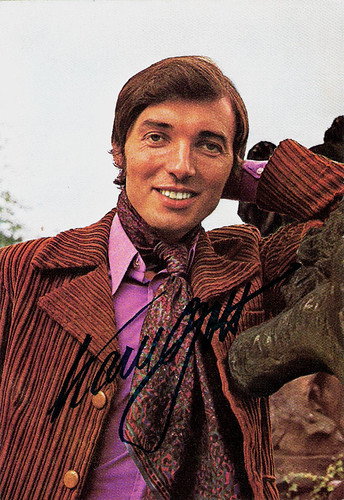
German promotion card by Polydor.
Compilation of early TV performances by Karel Gott. Source: Hit That Button (YouTube).
Karel Gott sings Kam tenkrát šel můj bratr Jan. Source: Benetomm (YouTube).
Sources: Jan Adam (KarelGott.com), Zuzana Drotárová (Gott.cz), Steve Leggett (AllMusic), Wikipedia (German and English) and IMDb.
This post was last updated on 15 June 2024.

East-German postcard by Progress Starfoto, no. 2376, 1965. Karel Gott in Kdyby tisíc klarinetu/If a Thousand Clarinets (Ján Rohác, Vladimír Svitácek, 1965).

German postcard by Franz Josef Rüdel, Filmpostkartenverlag, Hamburg, no. 4909. Photo: Polydor / Hoffmann.

East-German postcard by VEB Progress Film-Vertrieb, Berlin, no. 3094, 1968. Karel Gott in Ta nase písnicka ceská/The Czech song (Zdenek Podskalský, 1967).

German promotion card by Polydor.

East-German postcard by Progress Film-Verleih, Berlin, no. 113/77, 1977. Photo: Mirvald.
Eyes covered by snow
Karel Gott was born in 1939 in Pilsen, at that time Protectorate of Bohemia and Moravia, now Plzeň, Czech Republic, and has lived in Prague since age 6. He initially wanted to study art but failed the exams at the School of Industrial Art, upon which he began training as an electrician.
On completing his studies, he began working as an electrician but was soon fascinated by the new types of music flooding the city, and became interested in jazz. He experimented with playing the bass and the guitar but eventually decided to focus on singing, studying it privately. In 1958, he participated in the amateur singing contest Looking for New Talent in the Prague Slavonic House. He utterly failed to impress the judges, but soon made a name for himself in Prague jazz circles, finally getting his first engagement at the Vltava Prague Cafe that same year.
In 1960, he decided to undertake singing professionally. He studied opera at the Prague Conservatory under Konstantin Karenin, a student of the brilliant Russian bass Feodor Chaliapin. Knowing of Gott's interest in current musical trends, Karenin instructed him not only in classical Italian pieces but also in the hits of the day. It was at this time that Gott travelled abroad (to Poland) for the first time with the Jazz Orchestra of the Czechoslovak Broadcast, conducted by Karel Krautgartner.
In 1962 or 1963 (the sources differ), Gott released his first single, Až nám bude dvakrát tolik (When we are twice as old), a duet with jazz singer Vlasta Průchová. Gott was voted into the Zlatý slavík (Golden Nightingale) viewer's survey, placing 49th and receiving a total of three votes.
His first solo single, 'Mesicni reka', the Czech version of 'Moon River' became his breakthrough hit in 1962. In 1963 Gott was offered a place at the recently founded Prague Semafor theatre, which was then at the forefront of the emerging Czechoslovakian pop music scene. He released 'Oči sněhem zaváté' (Eyes Covered by Snow), which became the year's best-selling record. Shortly afterwards, Gott received the first of his Zlatý slavík awards, given to the most popular artist of the year.

Czech postcard by Pressfoto, Praha (Prague). Photo: Karel Gott and Jana Brejchova in Kdyby tisic klarinetu/If a Thousand Clarinets (Ján Rohác, Vladimír Svitácek, 1965). Collection: Carla Bosch.
Carla: I suspect that on these two cards is the film crew making the documentary. With Jana Brejchova, Waldemar Matuska, Hana Hegerova, Eva Pilarova, Karel Gott, Jiri Suchy, and Jiri Slitr. They are all watching television. In the public are soldiers who are holding musical instruments.

Czech postcard by Pressfoto, Praha (Prague). Photo: publicity still for Kdyby tisic klarinetu/If a Thousand Clarinets (Ján Rohác, Vladimír Svitácek, 1965). Collection: Carla Bosch.
Carla: Kdyby tisic klarinetu/If a Thousand Clarinets (Ján Rohác, Vladimír Svitácek, 1965) is a fantasy musical film about a mysterious statue of the composer Johann Sebastian Bach that changes guns into musical instruments. The news spreads and a television station decides to make a documentary film about the subject. My guess is that it must be something like how music can change people. And, more peculiarly, how soldiers change when they are not holding guns, but musical instruments instead... But that is just a wild guess.

Czech postcard by Nakladatelstvi Pressfoto, Praha, no. C 11148. Photo: Vileru Rosegnal.

Czech postcard by Nakladatelstvi Pressfoto, Praha, no. C 23365-3. Photo: Jaromir Svoboda.
Maya the Honey Bee
In 1965, Karel Gott was a major star, appearing in the programmes Pilgrimage for Two and Evening Prayer while building his own repertoire with his own orchestra. That year, he made his first film appearance in the musical Kdyby tisíc klarinetu/If a Thousand Clarinets (Ján Rohác, Vladimír Svitácek, 1965) with Jana Brejchová. He also established the Apollo Theatre, along with two brothers who were with him in Semafor: Jiří and Ladislav Štaidl. He began composing his own songs and toured Czechoslovakia and abroad with the Apollo Theatre.
His first album, 'Karel Gott Sings' got great acclaim. This first album was followed by an English export album titled 'The Golden Voice of Prague'. In 1967, Gott performed at MIDEM, the International Fair of Record Companies and Music Producers in Cannes, France, where the applause was measured during every concert. He surprised everyone by achieving a level of 54 to Tom Jones' 58. Following this event, Gott signed a contract with the Polydor / Deutsche Grammophon Gesellschaft record company, renewing it several times until it became a life contract in 1997. Between 1967 and 2000, Polydor released over 125 albums and 72 singles for Karel Gott in German-speaking countries in Europe.
Films in which he appeared were Mucedníci lásky/Martyrs of Love (Jan Nemec, 1967) with British director Lindsay Anderson, and the German comedy Charley's Onkel/Charley’s Uncle (Werner Jacobs, 1969) featuring Gustav Knuth. Gott represented Austria in the Eurovision Song Contest 1968 with the song 'Tausend Fenster', written by Udo Jürgens. He finished in 13th place. In the same year, Gott spent six months performing daily at the New Frontier Hotel and Casino in Las Vegas.
In the 1970s, domestic success was marked by Gott's presence on television, including the filming of a ten-part serial entitled Karel Gott in Slany. In 1971, after deciding not to return from a concert tour in West Germany to his home country, he was addressed a personal letter from the Czechoslovak party leader Gustav Husak persuading him to change his mind. One of his most best-known pop hits was the title music to the Japanese anime series Maya the Honey Bee (1975). The original theme was composed by Karel Svoboda and sung by Karel Gott in the German, Czech and Slovak versions. In 1975 he also played the lead in the film musical Hvezda pada vzhuru/A Star Is Falling Upwards (Ladislav Rychman, 1975).
Karel Gott recorded a cover version of the song 'All by Myself' called 'Kam tenkrát šel můj bratr Jan' (Where Did My Brother Jan Go This Time). The song was dedicated to Jan Palach who set himself on fire and burned to death as a protest against Soviet occupation of Czechoslovakia in January 1969. According to Wikipedia, the song was recorded in 1977 while Soviet troops were still present in the country. To continue in his career, he had to sign in 1977 the so-called ‘Anti-charter’, a petition organised by the Communist government against Charter 77 signed by Václav Havel and other dissidents, protesting the government's violations of the Helsinki Accords.

Czech postcard by Nakladatelstvi Pressfoto, Praha, no. 53/3. Photo: Alexandr Janovsky.

East-German postcard by Bild und Heimat, Reichenbach, no. G 6776, 1976. Photo: Leher, Berlin.

East-German postcard by Progress, Berlin, no. 33/76, 1976. Photo: publicity still for Hvezda pada vzhuru/A Star Is Falling Upwards (Ladislav Rychman, 1975) with Zuzana Kocúrlková.

East-German postcard by Progress, Berlin, no. 41/76, 1976. Photo: publicity still for Hvezda pada vzhuru/A Star Is Falling Upwards (Ladislav Rychman, 1975) with Zuzana Kocúrlková.
His second great love
The 1980s were marked for Karel Gott by international success, including the filming in Italy of the musical In the Track of Bel Canto (1981), with a corresponding German-Italian album and duet performance with Sofia Rotaru in the Soviet Union. In the following years, Gott received many awards, including The Supraphon Diamond Record Award, given him in 1992, for having sold 13 million records.
In 1990, he decided to end his career and arranged a huge farewell tour. However, the tour was so successful that he re-evaluated his decision. The 1990s were influenced by fundamental changes in the political system of the country, which were reflected in popular music, but it did not threaten his permanent position in the limelight of the domestic music scene. In 1991 a new television survey was created called TýTý. Karel Gott gained the first victory and at the same time became the outright winner of the survey.
In 1993, he established his own artistic agency, GOJA, with František Janeček. It is this agency that lately produced Gott's records and organised his artistic activities. In 1996, following renewed public interest in his career, Gott again won 'The Golden Nightingale Award' with a huge lead over his rivals, and retained the accolade many times since. Gott remained popular in several countries, including those of the former Soviet Union, where his first record, produced by Melodiya in 1977, sold a staggering 4.5 million copies. In 2000, he had his first concert at Carnegie Hall, in New York.
During the 1990s, Gott began to focus increasingly on painting, his second great love. The first exhibition of his paintings took place in 1992, at the Prague Christ Child Gallery. He also exhibited his work successfully in Berlin, Moscow, Munich, Cologne, Vienna, and Bratislava. In 2001, he played the double role of Lucifer and God in the family comedy Z pekla stestí 2/Goblins and Good Luck 2 (Zdenek Troska, 2001). He also acted regularly in TV series.
Gott had two adult daughters, Dominika and Lucie, from former relationships (they have different mothers). He was also the father to Charlotte Ella with Ivana Macháčková whom he married in 2008 in Las Vegas, the city where he started his international career. Their second daughter, Nelly Sofie, was born in the summer of 2008. Karel Gott passed away in Prague, Czech Republic, at the age of 80.

German promotion card by Polydor, no. 49.

German promotion card by Polydor.
Compilation of early TV performances by Karel Gott. Source: Hit That Button (YouTube).
Karel Gott sings Kam tenkrát šel můj bratr Jan. Source: Benetomm (YouTube).
Sources: Jan Adam (KarelGott.com), Zuzana Drotárová (Gott.cz), Steve Leggett (AllMusic), Wikipedia (German and English) and IMDb.
This post was last updated on 15 June 2024.
No comments:
Post a Comment